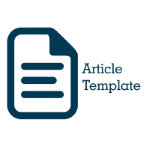KEY COMPETENCIES FOR TVET TEACHERS IN THE AGE OF INDUSTRY 4.0: ADAPTING TO TRANSFORMATIVE CHALLENGE
Abstract
Vocational teachers in Technical and Vocational Education and Training (TVET) organizations play a vital role in the vocational technical education landscape of the country. The professional development of these teachers is essential for acquiring the necessary knowledge and competency skills. This article delves into the competency elements required to effectively navigate the challenges presented by the Fourth Industrial Revolution among vocational teachers in Malaysia. The literature review serves as a roadmap for understanding the competency elements that vocational teachers need to adapt to in order to tackle the current challenges in the industrial sector. This conceptual paper, drawn from the literature review, contributes to the theoretical advancement of competencies by focusing on the key elements central to the development of TVET teachers' competencies: knowledge, skills, and attitudes. These elements serve as crucial benchmarks for producing competent and professional instructors capable of addressing the challenges of the Fourth Industrial Revolution era in Malaysia.
Keywords
Full Text:
PDFReferences
Ally, M. (2019). Competency Profile of the Digital and Online Teacher in Future Education. International Review of Research in Open and Distance Learning, 20(2), 302–318.
Ana, A., Kustiawan, I., Ahman, E., Zakaria, S., Muktiarni, M., Dwiyanti, V.,& Kahoerunnisa, I. (2020). Defining Vocational Teacher Competencies in Industry 4.0 from the Perspective of Policymakers. Journal of Engineering Education Transformations, 34(Special Issue).
Arksey, H., & O'Malley, L. (2005). Scoping studies: Towards a Methodological Framework. International Journal of Social Research Methodology, 8(1), 19-32. https://doi.org/10.1080/1364557032000119616
Chinedu, C. C., Wan Mohamed, W. A., & Ajah, A. O. (2018). A Systematic Review on Education for Sustainable Development: Enhancing TVE Teacher Training Programme. Journal of Technical Education and Training, 10(1).
Colley, H., James, D., Diment, K., & Tedder, M. (2003). Learning as Becoming in Vocational Education and Training: Class, Gender and The Role of Vocational Habitus. Journal of Vocational Education and Training, 55(4), 471-498.
Ertmer, P. A., & Ottenbreit-Leftwich, A. T. (2010). Teacher Technology Change: How Knowledge, Confidence, Beliefs, and Culture Intersect. Journal of Research on Technology in Education, 42(3), 255-284.
Fadel, N. S. B. M. (2021). Penerapan Kemahiran Insaniah dalam Kalangan Bakal Guru Tvet Bagi Menghadapi Revolusi Industri 4.0.(Master Thesis. Universiti Teknologi Malaysia).
Handayani, M. N., Ali, M., Wahyudin, D., & Mukhidin, M. (2020). Green Skills Understanding of Agricultural Vocational School Teachers Around West Java Indonesia. Indonesian Journal of Science and Technology, 5(1), 21-30.
Hatlevik, O. E. (2017). Examining the Relationship Between Teachers’ Self-Efficacy, Their Digital Competence, Strategies to Evaluate Information, and Use of ICT At School. Scandinavian Journal of Educational Research, 61(5), 555–567. doi:10.1080/00313831.2016.1172501.
Hermann, M., Pentek, T., & Otto, B. (2016). Design Principles for Industries 4.0 Scenarios. The 49th Hawaiian International Conference on Systems Science.
Hong, S. K., & Yoon, S. C. (2018). A Study on the Development of Teacher Competency Standards in Digital Textbook Environment. 9th International Conference on Information and Communication Technology Convergence: ICT Convergence Powered by Smart Intelligence, ICTC 2018, 291–296.
Indrawan, P. A., & E.Lay, A. (2019). Guidance and Counselling Teachers’ Competency Perspective in the Era of Industrial Revolution 4.0. International Journal of Innovation, Creativity and Change, 5(3), 147–161.
International Board of Standard for Training, Performance, and Instruction. (2006). Instructor Competencies. Retrieved from http://ibstpi.org/instructor-competencies/
Irwanto, I. (2019, May). Kompetensi Guru Vokasional SMK Di Era Revolusi Industri 4.0. In Prosiding Seminar Nasional Pendidikan FKIP, 2(1), 182-204.
Ismail, K., Nopiah, Z. M., Rasul, M. S., & Leong, P. C. (2017). Malaysian Teachers’ Competency in Technical Vocational Education and Training: A Review. In Abdullah et al. (Eds.), Regionalization and Harmonization in TVET. London: Taylor & Francis Group.
Ismail, A., Hassan, R., Abubakar, A., Hussin, H., Mat Hanafiah, M. A., & Asary, L. H. (2018). The Development of TVET Educator Competencies for Quality Educator. Journal of Technical Education and Training, 10(2), 38–48.
Jafar, D. S. A., Saud, M. S., Hamid, M. Z. A., Suhairom, N., Hisham, M. H. M., & Zaid, Y. H. (2020). TVET teacher professional competency framework in industry 4.0 era. Universal Journal of Educational Research, 8(5), 1969-1979.
Junita S. & Wan M. R. W. A. (2018). Kompetensi dalam Menentukan Profesionalisme Guru Vokasional di Malaysia: Cabaran ke arah Pembangunan Profesionalisme Guru TVET.
Kementerian Pendidikan Malaysia. (2018). Laporan Tahunan 2017: Pelan Pembangunan Pendidikan Malaysia 2013-2025. Putrajaya: Kementerian Pendidikan Malaysia.
Kusumah, W. (2019). Menyiapkan Guru dan Dosen di Era Revolusi Industri 4.0 dalam https://www.kompasiana.com/wijayalabs/5dd36340d541df29bf6153c2/menyiapkan-guru-dosen-di-era-revolusi-induatri-4-0 Diakses 30 November 2019.
Klaus, S. (2016). The Fourth Industrial Revolution. Geneva: World Economic Forum. ISBN 1944835008.
Lase, D. (2019). Education and Industrial Revolution 4.0, 10(1), 48–62.
Liffler, M., & Tschiesner, A. (2013). The Internet of Things and the Future of Manufacturing. McKinsey & Company.
Refbacks
- There are currently no refbacks.
This is an Open Access article distributed under the terms of the Creative Commons Attribution-NonCommercial-NoDerivatives 4.0 International (CC BY-NC-ND 4.0), permitting copy and redistribute the material in any medium or format.




